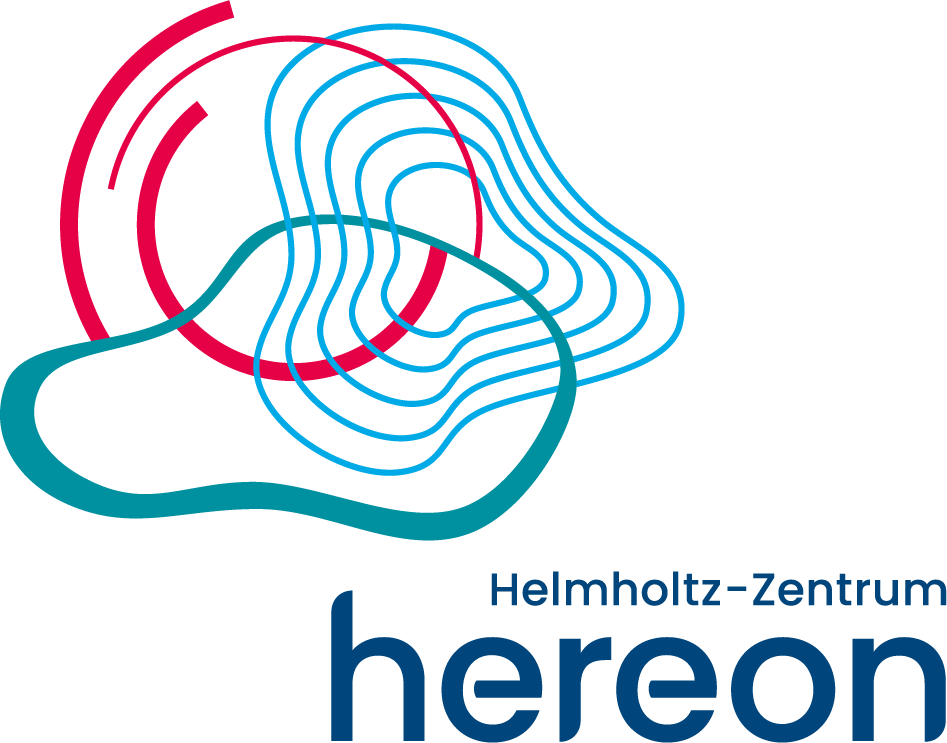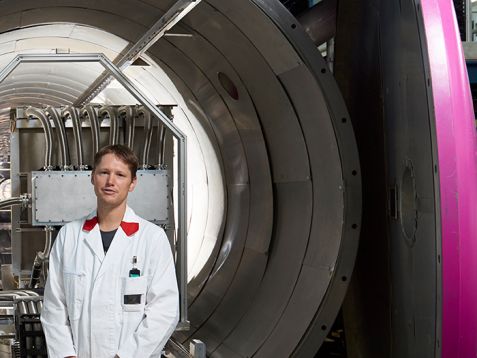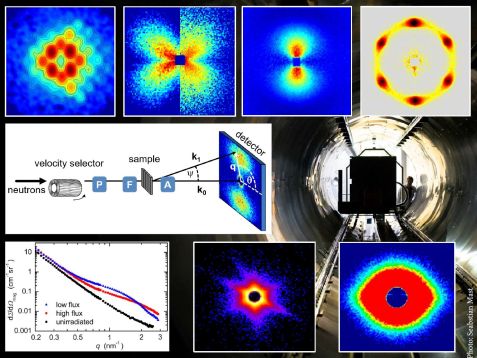MLZ is a cooperation between:
 > Technische Universität München
> Technische Universität München > Helmholtz-Zentrum Hereon
> Helmholtz-Zentrum Hereon
 > Forschungszentrum Jülich
> Forschungszentrum Jülich
MLZ is a member of:
 > LENS
> LENS > ERF-AISBL
> ERF-AISBL
MLZ on social media:

MLZ (eng)
Lichtenbergstr.1
85748 Garching
12.03.2019
Scientists study method for researching magnetic materials

Dr. Sebastian Mühlbauer (Technical University of Munich) is instrument responsible at the small angle scattering instrument SANS-1 at MLZ. © W. Schürmann / TUM
Physicists from the University of Luxembourg, the Heinz Maier-Leibnitz Zentrum (MLZ) and a team of research partners have demonstrated for the first time in a comprehensive study how different magnetic materials can be examined using small-angle neutron scattering. The scientists around Dr. Sebastian Mühlbauer (MLZ, Technical University of Munich) and Prof. Dr. Andreas Michels (University of Luxemburg) have published their insights in “Reviews of Modern Physics,” the respected science journal of the American Physical Society.
From computers to loudspeakers to electric cars and wind turbines, most electronic devices function with the help of magnetism. Understanding why magnetic materials have certain properties is crucial to refining these technologies. “The regime between a nanometre and a micrometre, determines the properties of many materials. The microstructure of a material has a major influence on the thermal, electric, magnetic and mechanical properties of a metal,” explains Andreas Michels, Associate Professor in Physics and Materials at the University of Luxembourg and one of the main authors of the paper.

The researchers examine magnetic materials with the small angle neutron scattering technique, which are used in electronic devices. © S. Mühlbauer / TUM; Sebastian Mast
Die vielleicht wichtigste Methode, um die Vorgänge auf dieser Ebene zu untersuchen, ist die Neutronenkleinwinkelstreuung. „Aufgrund der magnetischen Wechselwirkung der Neutronen und gleichzeitig der Möglichkeit auch Volumenproben zu untersuchen, ist magnetische Neutronenkleinwinkelstreuung eine einzigartige Messtechnik zur Aufklärung von Magnetismus auf der Nanoskala“, sagt Dr. Sebastian Mühlbauer, Instrumentverantwortlicher an der Kleinwinkelstreuanlage SANS-1 des MLZ und Erstautor der Veröffentlichung.
Perhaps the most important method for examining processes at this level is small-angle neutron scattering. “Because of the magnetic interaction of neutrons and the possibility to examine bulk samples, small-angle neutron scattering is a unique measuring technique to investigate magnetism on the nano scale ,” explains Dr. Sebastian Mühlbauer, responsible instrument scientist at the small-angle scattering instrument SANS-1 of the MLZ and first author of the publication.
The review paper, which was produced in cooperation with researchers at Technical University of Munich, the University of Luxemburg, the University of Notre Dame, the University of Minnesota, the Institut Laue-Langevin, the University of Cologne, the Helmholtz-Zentrum Dresden-Rossendorf, ABB in den USA, General Numerics in Jena and the Helmholtz-Zentrum Geesthacht, focuses on analysis techniques. “For the first time, we undertook a comprehensive study to determine which broad class of materials can be researched using neutron scattering techniques,” says Andreas Michels. “Among other things, we are interested in superconductors, permanent magnets, shape-memory alloys, ferrofluids – almost the whole spectrum of magnetic materials from specific applications to fundamental research in solid-state physics.”
The results of the work can be used by physicists and material researchers to get an overview of the range of applications for neutron scattering technology, but also by engineers to make predictions about load-bearing capacity, wear and tear, and the qualities of materials under changing conditions.
Text: Adapted from University of Luxemburg
Original publication:
Sebastian Mühlbauer, Dirk Honecker, Élio A. Périgo, Frank Bergner, Sabrina Disch, André Heinemann, Sergey Erokhin, Dmitry Berkov, Chris Leighton, Morten Ring Eskildsen, and Andreas Michels. „Magnetic small-angle neutron scattering“. Reviews of Modern Physics 91, 015004 – Published 4 March 2019; DOI: 10.1103/RevModPhys.91.015004
MLZ is a cooperation between:
 > Technische Universität München
> Technische Universität München > Helmholtz-Zentrum Hereon
> Helmholtz-Zentrum Hereon
 > Forschungszentrum Jülich
> Forschungszentrum Jülich
MLZ is a member of:
 > LENS
> LENS > ERF-AISBL
> ERF-AISBL
MLZ on social media:


